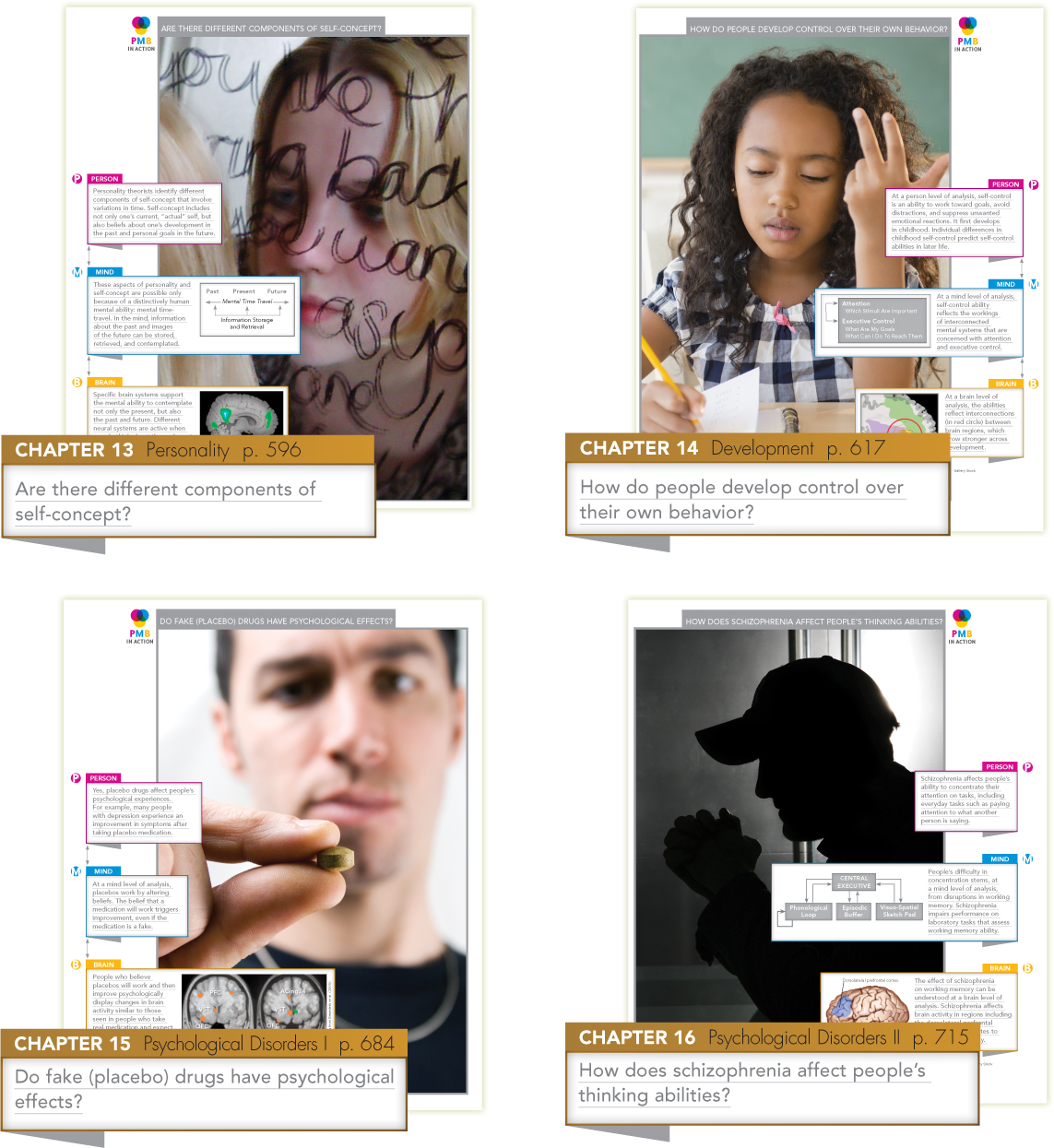Frontmatter Introduction


The woman in our cover image (see cover at top), a drawing by Spanish artist Juan Francisco Casas, is intent; she perceives with a purpose—
The Target of Study: As British psychologist Hans Eysenck put it, psychology is about people: thinking, feeling, self-
The Scientific Strategy: Psychology is built on scientific observation. The first step in constructing the science is not to speculate idly about human nature; it is to carefully observe people. Advice from the great Austrian philosopher Ludwig Wittgenstein sums up the strategy: “Don’t think, but look!”
Our Invitation to the Reader: You are a keen observer of the social world. You have important insights about the topics addressed in this book. Use them! Join us, the author team and the global community of psychological scientists, as we look into the powers of brain and mind and the complexities of persons’ lives: the phenomena that make psychology the most compelling of twenty-
Psychology
The Science of Person, Mind, and Brain
Daniel Cervone
University of Illinois at Chicago
Tracy L. Caldwell
Dominican University, pedagogical author

Publisher: Rachel Losh
Senior Acquisitions Editor: Daniel DeBonis
Development Editors: Cathy Crow, Mimi Melek
Assistant Editor: Nadina Persaud
Editorial Assistant: Katie Pachnos
Marketing Manager: Katherine Nurre
Marketing Assistant: Allison Greco
Executive Media Editor: Rachel Comerford
Director of Editing, Design, and Media Production for the Sciences and Social Sciences Tracey Kuehn
Managing Editor: Lisa Kinne
Senior Production Editor: Vivien Weiss
Production Manager: Sarah Segal
Photo Editor: Bianca Moscatelli
Photo Research: Elyse Rieder; Rona Tuccillo
Art Director: Diana Blume
Interior and Cover Designer: Babs Reingold
Art Manager: Matthew McAdams
Illustrations: Evelyn Pence; Raised Media
Composition: TSI evolve
Printing and Binding: RR Donnelley
Cover Art: Juan Francisco Casas
Library of Congress Preassigned Control Number: 2014952936
ISBN-
ISBN-
© 2015 by Worth Publishers
All rights reserved.
Printed in the United States of America
First printing
Worth Publishers
41 Madison Avenue
New York, NY 10010
Credit is given to the following sources for permission to use the infographics photos indicated:
Chapter 1: Gallery Stock
Chapter 2: Gallery Stock (main); Tek Image/Science Source (bottom inset)
Chapter 3: Gallery Stock
Chapter 4: Eric O’Connell/Gallery Stock (main); Jaroslaw Wojcik/ Getty Images (middle inset); PNAS (bottom inset)
Chapter 5: Michael Doolittle/Alamy (main); From Huk (2008). Reprinted with permission from Elsevier (bottom inset)
Chapter 6: Aaron Josefczyk/Reuters/Corbis
Chapter 7: Solidcolours/Getty Images (main); From Kandel (2000). © McGraw-
Chapter 8: Science Photo Library/Alamy (bottom inset)
Chapter 9: Gallery Stock (main); From Dehaene & Naccache (2001). © 2001 Elsevier (middle inset); From Izhikevich & Edelman (2008). © 2008 by The National Academy of Sciences, USA (bottom inset)
Chapter 10: Peeter Viisimaa/Getty Images
Chapter 11: Popperfoto/Getty Images (main); From D’Argembeau et al. (2010). © 2010 Massachusetts Institute of Technology (bottom inset)
Chapter 12: © AP/Corbis
Chapter 13: Rae Merrygold (main); Research from D’Argembeau et al. (2008; bottom inset)
Chapter 14: Gallery Stock (main); Research from Uddin et al. (2011; bottom inset)
Chapter 15: Sabrina Pintus/Getty Images (main); Research from Benedetti et al. (2005; bottom inset)
Chapter 16: Matt Howell/Gallery Stock
Prepared with TLC for the future of psychology: The Intro Psych student

DANIEL CERVONE is Professor of Psychology at the University of Illinois at Chicago. He earned his BA at Oberlin College and his PhD from Stanford University, where he was a student of Albert Bandura. He has held visiting faculty positions at the University of Washington and the University of Rome “La Sapienza,” and has been a Fellow at the Center for Advanced Study in the Behavioral Sciences.
In addition to introductory psychology, Dan teaches courses in personality psychology, social cognition, and research methods to the diverse student body at UIC. He is graduate advisor to students in both social/personality and clinical psychology in UIC’s doctoral program in psychology, and serves as a Fellow in UIC’s undergraduate Honors College.
Dan is the author of a graduate-

TRACY L. CALDWELL (Pedagogical Author) is Associate Professor of Psychology at Dominican University, where she was recently appointed a Diversity Fellow. She earned her BA at The College of New Jersey and her PhD in personality and social psychology from the University of Illinois at Chicago. Tracy teaches introductory psychology, as well as personality psychology, social psychology, the psychology of gender, and research methods and statistics. She has also taught seminars in social cognition and the psychology of romantic relationships. She is the faculty advisor for Dominican University’s Psychology Club and Dominican University’s chapter of Psi Chi, the International Honors Society in Psychology.
Tracy has published articles on a variety of topics, including how stereotypes are formed, how people with a repressive coping style process threat, and how to best assess humor styles. She currently conducts research on the scholarship of teaching and learning, sex differences in the attractiveness of humor in romantic relationships, and the efficacy of accommodating learning styles.